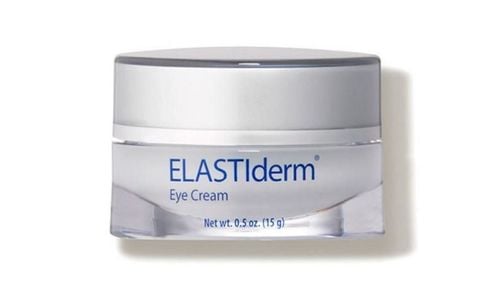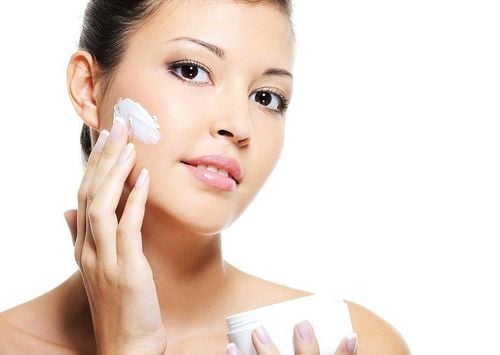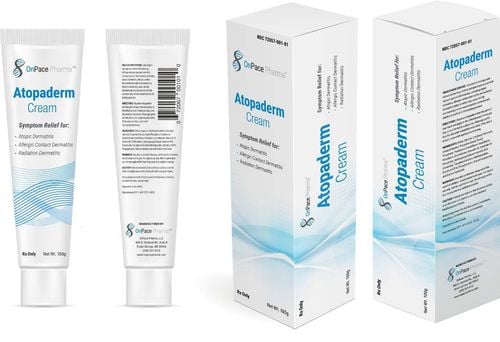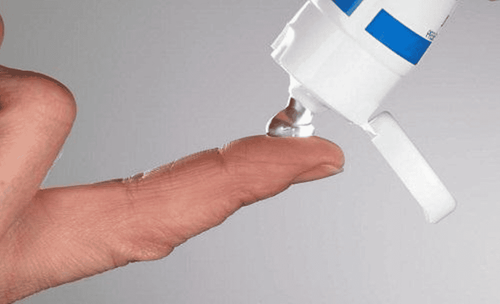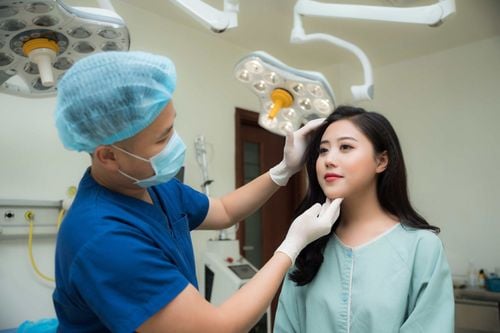This is an automatically translated article.
Skin lightening is understood as lightening spots, patches or overall skin areas. Skin-lightening agents are also known as skin whiteners, blemish-fading creams, or bleaching creams. So does olive oil have a skin lightening effect? To answer this question, we need to learn the basics of how skin lighteners work and the properties of olive oil.
1. How do skin lighteners work?
First, let's look at the effects of skin lighteners. These substances usually act at the surface or top layer of the skin and work by the following mechanisms:
1.1. Reduce skin pigmentation
Melanin is the pigment in human skin. The more melanin we have, the darker our skin color will be. Melanin is made by melanocytes in the skin. Skin lighteners block or slow down the production of melanin by melanocytes and prevent melanin from reaching the top layer of the skin. The effects of skin lighteners are not permanent as new melanocytes are constantly growing as the skin regenerates and changes over time.
1.2. Enhances exfoliation of dead skin cells
Removes old skin cells to help restore tanned or damaged skin. However, the natural exfoliation process slows down as we age.
Some skin lighteners work to trigger faster exfoliation. This leads to more skin cell turnover, so lighter cells appear on the surface of the skin.
1.3. Sunscreen
Skin lighteners may also contain sunscreen agents to protect glowing skin from sun damage and limit tanning. Ingredients that block the sun's ultraviolet (UV) rays include: zinc oxide; titanium dioxide.

Một tác dụng của dầu oliu chính là chống nắng
2. What is olive oil?
Olive oil is extracted and pressed from the fruit of the olive tree. Not all olive oil is created equal. Usage affects the healthy fat content and nutrients, and even affects the flavor of the olive oil.
Extra Virgin Olive Oil (EVOO) produced by cold pressing without the use of chemicals or heat; Refined olive oil is usually the most common. This type is processed by chemicals or a mixture of olive oil and other vegetable oils to make it. This may result in fewer health benefits; Regular olive oil is a mixture of virgin and refined oils. In addition, it is often made with unripe olives and is not usually available in stores. EVOO is the preferred variety because the manufacturing process helps it maintain many of its nutritional properties and contains fewer chemicals or additives than in olive oil .
3. Skin care effects of olive oil
Olive oil can benefit the skin, through nutrition and skin care measures:
3.1. The effect of olive oil on the skin in the diet
Reliable research shows that eating olive oil and foods with omega-3 fatty acids reduces inflammation (swelling, redness) in the body.
This helps prevent or heal skin damage caused by inflammation. For example, sun damage or inflammatory skin disease causes signs such as age spots, wrinkles, and rashes.
3.2. Olive oil in skin care products
Olive oil is an ingredient in many cosmetic and skin care products on the market. Olive oil ingredients in skin care products often have names such as:
Hydrogenated olive oil; olea europaea fruit oil; Olive acid; Potassium olives; Sodium olivate;
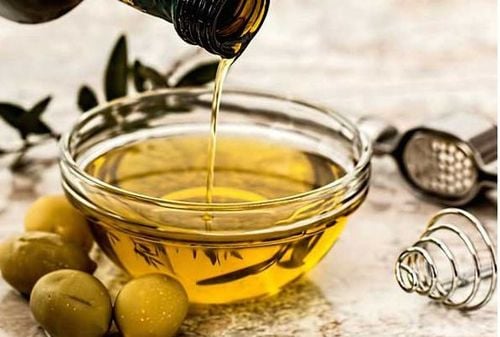
Các sản phẩm dưỡng da có thành phần oliu giúp làm sáng da
3.3. Olive oil applied to the skin
Topical application of olive oil can block about 20% of the sun's harmful ultraviolet (UV) rays by promoting the formation of the skin's natural sunscreen proteins. Olive oil also contains a type of fat called squalene, which is the most important natural skin-protective fat. Besides, applying olive oil strengthens the body's natural barrier.
The antioxidants present in olive oil can prevent damage. However, more research is needed on the antioxidant benefits of olive oil as a food or for use on the skin.
3.4. Extra virgin olive oil brightens skin
Extra virgin olive oil (EVOO) has little effect on skin lightening. It does not reduce the melanin pigment or increase the exfoliation of dead skin cells. However, EVOO can prevent sun damage and pigmentation. In addition, it can also treat redness and wrinkles on the skin.
4. What skin care products is olive oil in?
Olive oil is an ingredient in many cosmetics and skin care products such as lotions, moisturizers, makeup products, facial cleansers, sunscreens, bath soaps, shampoos and hair conditioners.
Olive oil has a number of skin care benefits such as:
Cleansing the skin; Emulsifying other ingredients; Moisturizer : Hydrates or forms a protective barrier on the skin; Natural Sunscreen: Olives form a physical barrier to the sun;
5. Some ways to care for your skin with olive oil
5.1. Exfoliate with olive oil and lemon juice
Some people use a mixture of olive oil and lemon juice to lighten their skin and hair. Lemon juice is not a true skin bleaching agent, although it does contain antioxidants that help soothe skin damage that causes dark spots.
Skin lightening effect is due to citric acid in lemon juice and exfoliation of dead skin cells. However, you need to use this mixture in moderation because acids can cause irritation, dry skin and redness.
Citrus fruits may cause skin reactions in some people when used on skin that is regularly exposed to the sun. This condition is called phytophotodermatitis.
5.2. Makeup remover with olive oil
Olive oil is considered a natural makeup remover. Users can dab olive oil on a cotton pad or towel and gently wipe away makeup. Olive oil cleanses the skin without the use of other chemicals.
5.3. Moisturizing with olive oil
Similar to using olive oil as a makeup remover, users can use a cotton ball soaked in olive oil as a moisturizer to clean and dry the skin. Finally, use a clean towel to absorb excess oil.

Dầu oliu làm sáng da và dưỡng ẩm hiệu quả
5.4. Side effects of olive oil on skin
All natural vegetable oils have side effects when used directly on the skin. A medical study showed that applying extra virgin olive oil to the skin for 4 weeks caused an allergic reaction. This happens even in people who don't have any history of skin allergies.
Olive oil creams often contain only oil extracts or a mixture of different ingredients. This makes them possibly safer than extra virgin olive oil. Applying olive oil topically on a regular basis can cause skin irritation. This happens when olive oil clogs pores or breaks down the skin's other natural oils.
6. Other skin lightening products
Traditional skin lightening products contain one or more ingredients that have a bleaching effect. These ingredients include:
Arbutin; Azelaic acid; Glabridin (licorice extract); Glycolic acid; Hydroquinone (tocopheryl acetate, tocopherol); Kojic acid (mushroom extract); Retinoids (retinol, tretinoin) Some people use injectable skin-lightening products, but the Food and Drug Administration (FDA) doesn't recommend this because there isn't enough evidence that they work. use and may carry many health risks. All skin lighteners can cause skin irritation, so only use as directed or by your doctor.
Skin lightening agents found in cosmetics are advertised to whiten or even even out skin tone. Some are used medically to treat skin changes such as:
Freckles; Smudge; Hyperpigmentation; Melasma (pigmentation patches on the skin); Acne Scars; Tortoise spots. More research is needed on the effects of olive oil on the skin. When used as a food, studies show it has many benefits both internally and externally. Users should add more olive oil to their daily diet. This heart-healthy vegetable oil can be made as a salad dressing or boiled. Olive oil has a lower evaporation point than other oils and should not be used for high-heat cooking.
In conclusion, olive oil is not a true skin lightener as a cosmetic, but it does have some UV protection and reduces redness.
Please dial HOTLINE for more information or register for an appointment HERE. Download MyVinmec app to make appointments faster and to manage your bookings easily.
Reference source: healthline.com




